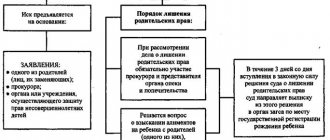Nowadays, refusal of paternity is a common occurrence. The law allows for the abandonment of a child, but at the same time establishes a very complex and time-consuming procedure for abandonment. According to statistics, over the last five years there has been an increase in the number of applications for voluntary renunciation of paternity. This type of refusal is not provided for by any legal norm of the country's legislation: Articles No. 68-70 of the RF IC, they say that the refusal of parental rights is of a forced nature and is implemented in court. It is impossible to unilaterally formalize the abandonment of a child by the father only at the request of the man.
Is it possible to refuse paternity?
From the point of view of the law, such a procedure as renunciation of paternity is not provided for. It is impossible to get rid of paternal obligations voluntarily or forcibly.
Do not forget! A father deprived of parental rights still remains obligated to pay child support. But at the same time, he is deprived of the opportunity to somehow participate in the fate of the baby.
But, any rule has a number of exceptions. You can lose your father's title voluntarily or in court:
- If the baby’s mother has found a new husband who intends to adopt the child.
- If a man suspects there is no blood connection with the child. In this case, the court releases the man not only from parental rights, but also from responsibilities.
Consequences of failure
A parent's relinquishment of parental rights, both forcibly and voluntarily, has the same consequences. The law provides for the following rights that a negligent parent loses:
- Taking care of the child.
- Representing the interests of the child in any instance.
- Protection and the right to demand the extradition of a child who is being held by strangers.
- The right to inherit the property of a minor after his death.
- Receiving benefits and allowances.
- Receiving alimony in case of incapacity.
One responsibility remains for the parent. This is the payment of child support until the child reaches 18 years of age. The state only waives child support if he is adopted.
The minimum period for paying alimony is 6 months. This can happen when, after abandoning a child, other people immediately adopt him. For example, the biological father abandoned the children, and they are then adopted by their mother's new husband.
Deprivation of the father's rights to the child
Some men express their desire to renounce paternity. There can be many reasons for this:
- reluctance to raise a sick child (Down syndrome, cerebral palsy, etc.);
- doubt about the fact of one’s own paternity since the moment of maternity hospital;
- unwillingness to fulfill the duties established by law;
- marginal lifestyle, etc.
To initiate a challenge to the fact of paternity, it is necessary to obtain a court verdict indicating that the man has been deprived of his legal rights to the child.
The court, which is obliged to make decisions, can not only deprive the father of parental rights, but also limit him in them.
Who is allowed to go to court and bring a claim for deprivation of rights to a child?
The following may file a claim to annul the rights of a minor and abandon the child:
- The mother and father who are recorded on the baby's birth certificate.
- Biological mother and father who are not recorded on the baby’s birth certificate.
- Persons appointed as official guardians and trustees of the child.
- Citizens who have a dependent child.
- A “former” child who has become an adult.
- The prosecutor (or guardianship inspectors), subject to compelling reasons and arguments.
The law provides for a number of exceptional situations in which renunciation of existing paternity is not considered by a judge:
- if at the time of recording information about the birth of a child in the registry office, the man was informed that there was no biological relationship with the baby;
- if there is written approval from the actual father to carry out artificial insemination of a woman.
Here is a sample form for a claim for deprivation of rights to a child:
application for relinquishment of parental rights by father
Expert opinion
Viktor Evgenievich
Representative of a private law firm, work experience - 7 years
Remember! Voluntarily abandoning your child is, in essence, the same thing as giving up paternal responsibilities and rights. Russian law allows this to be done only through the courts.
Voluntary refusal and its important points
The situation when the father is incapacitated or he has died requires special attention: voluntary renunciation of the title of father presupposes an understanding of the consequences of this.
Upon completion of the procedure for renunciation of paternity, the rights of the father are transferred in favor of the mother or adoptive parent. They can also be stopped completely.
When transferring paternal rights to another man, all documents must be notarized. If the child has already turned eighteen, then it will be impossible to file an application to renounce paternity in relation to him.
In the text of Art. No. 61 of the RF IC, states that the rights and responsibilities of parents end from the moment a young citizen reaches adulthood.
Voluntary deprivation of mother's parental rights
If the mother plans to renounce her rights to the child, then it is better to do this in the presence of a notary, who will document the legality of the procedure.
To do this, you need to complete the following steps:
- The mother draws up a statement of renunciation of the rights to her child, which was accepted in a sober mind and of good will, indicating that she agrees to the further adoption of the child by third parties; in addition, you can write in the statement a wish that the mother not be summoned to court on this issue. If there is a father of the child, then everything is the same, only on behalf of both parents;
- After drawing up the application, the mother hands over the document, certified by a notary, to her spouse for transfer to the guardianship authorities. At this stage, there is a mandatory condition for transferring the mother’s application into guardianship; the presence of at least two witnesses is required who will be ready to confirm in writing the fact of the mother’s voluntary abandonment of the child and her unwillingness to be present in court;
- After the guardianship authorities have recorded the application and verified all the circumstances for which the mother voluntarily renounces her rights, the application is submitted to the court for consideration on the merits;
- The proceedings in such circumstances proceed quickly; the only obligatory condition is the presence of the prosecutor and the state guardian at the hearing in order to give the status of legality to the decision.
At the stage of transferring the child to the state guardianship authorities, the mother can sign a document that will allow her to change her decision within six months and return the baby, restore the rights to the child, but if the mother immediately signs permission to adopt her baby, then the loss of rights occurs permanently, since The rights of the parent are transferred to the adoptive parent in full.
Deprivation of paternity by mutual consent of parents
Situations often occur when a woman gives her consent to renounce parental rights to her father’s child voluntarily. This happens when the mother of the baby:
- knows that the man whose name is indicated on the child’s birth certificate at the registry office is not the child’s biological father;
- entered into a subsequent marriage, and the new spouse expresses a specific desire to adopt the child, but the biological father is not involved with him.
If the above circumstances occur, then parents can formalize a voluntary renunciation of paternity by filing a statement of claim in court.
Challenging paternity is a procedure that can be initiated by the following persons:
- By the man whose name is written on the birth certificate of the child, by filing a claim against the child’s mother.
- By the biological father, through a claim against the parent listed in the civil register as the father.
In practice, when a child is born in a legal marriage, the husband of the child’s mother is indicated as the father. The same rule applies for three hundred days from the date of dissolution of the marriage.
Note! Provided that a man and a woman express mutual consent to formalize the renunciation of paternity, the procedure is carried out voluntarily in the courtroom.
If both participants in the court hearing agree with the claims, then genetic DNA testing may not be done.
Does the father's abandonment of the child exempt him from child support?
The current legislation of the Russian Federation does not provide for a legal mechanism for abandoning a child. In society, this is considered immoral and unacceptable, but due to various circumstances, parents take on such responsibility.
According to statistics, in most cases, refusals are written immediately after the birth of the child. Both parents simply do not pick up the baby from the hospital. But sometimes this is done later, and in this case the father’s abandonment of the child is often formalized. Such a decision is very difficult to make.
However, if it is nevertheless accepted, you should know how a father can abandon a child so that everything is formalized legally. And although there is no such article in the legislative framework, the state provides the opportunity to write an application for the father to abandon the child according to the established model.
The procedure is carried out only in court. It can be initiated voluntarily by writing an application to deprive the father of parental rights. In this case, payments to support the child are not canceled and the former parent remains responsible for the financial support of the son (daughter).
That is, depending on the circumstances, the court may order the former father to continue making payments required by law. The refusal of the father's rights to the child in itself does not automatically exempt him from alimony.
However, there are some nuances to this issue; they will be discussed further.
Reasons for refusal
In most cases, men are prompted to take this step by their reluctance to provide financially for their children. Many people believe that they can abandon their child in order to no longer pay child support. In fact, this opinion is wrong.
Family law establishes that when parental rights are deprived, any obligations of the minor in relation to the parent are terminated, and the obligations of the parent in relation to the child are retained by him until the established period (reaching the age of majority or emancipation). Thus, the son or daughter also retains property rights - he (she) can claim the inheritance equally with the father’s other children.
Let's consider valid reasons for refusal:
- Establishing the fact that the child is not related to the father by blood. To do this, a man needs to undergo a genetic examination, which makes it possible to determine the degree of relationship with 99.9% accuracy. If the DNA test determines that he is not the biological parent of the child, all records of paternity will be canceled. The former parent is also exempt from paying child support. If a man, when entering his data into the child’s birth certificate, knew that he was not his own, or gave written consent to the use of someone else’s biomaterial for artificial insemination of his wife, it is no longer possible to refer to the lack of kinship. The court will refuse to challenge paternity or order child support to be paid before the deadline established by law.
- Remarriage of the mother, if her new spouse expresses a desire to adopt a child. To do this, the new family can write a request to the biological parent for the voluntary deprivation of their rights and consent to the adoption of the child by the stepfather. The parent is released from all obligations for upbringing and maintenance, including the need to pay alimony, since they are delegated to the adoptive parent. In this case, the minor is not recognized as needy. The application for the transfer of paternal rights must be drawn up in the presence of both parents and certified by a notary.
- Writing a statement of refusal if the child was adopted by a man. Only in such a situation does the procedure take the form not of deprivation of parental rights, but of cancellation of adoption. To get a positive decision in such a case, the adoptive parent must be provided with compelling reasons for his action.
Refusal procedure
In order to formalize the deprivation of paternal rights, the judge must submit all the necessary documents. Depending on the circumstances and reasons that led to such a decision, their list may vary, but two of them are the main ones.
Documents required for the procedure:
- notarized refusal;
- written application to the court.
For the refusal to have legal force, it must be drawn up in the prescribed form and must be certified by a notary. For this purpose, you can contact any notary office that has the appropriate forms and samples for filling them out.
After drawing up the refusal, it, along with the application, is sent to the court, which considers the case in detail and renders a verdict on the advisability of depriving parental rights. In addition, the court determines the need to pay alimony or completely releases it.
If the child’s father is a chronic alcoholic or drug addict, the document on refusal need not be notarized. The mother herself can initiate the procedure for depriving the father of parental rights on the basis of his illness.
When considering such a case, representatives of the guardianship and trusteeship authorities who support the interests of the minor must be present.
The application for refusal must contain the following information:
- details of the judicial authority that will consider the case;
- passport details and registration of the applicant;
- personal data of the child abandoned by the parent;
- statement of the fact of a decision to refuse;
- the reasons that prompted you to commit such an act;
- permission for possible adoption;
- consent to deprivation of parental rights;
- signature and date of application.
You may be interested in: Documents required for divorce without the consent of the husband or wife
If the applicant does not wish to attend the hearing, he can indicate this in the application as a separate paragraph. Then the decision will be made without him. If he does not write this down and does not appear at the court hearing, the judge has the right to issue a refusal in the case, recognizing the reasons given as disrespectful.
Collection of alimony
The issue of financial support for the child is considered in the same process as the deprivation of parental rights from the father. The guardianship authorities submit to the judge a report on the examination of the child’s living conditions, on the basis of which the necessary calculations are made.
When calculating the amount of alimony, the following factors are taken into account:
- the health status of the minor;
- father's financial situation;
- wishes of the mother (guardian, trustee) of the child.
If during the course of the case it is revealed that the son (daughter) or mother suffered physical harm due to the actions of the former parent, they can submit an additional application to the court for compensation for the damage caused. The judge takes the side of the victims, makes a decision in their favor and obliges them to pay the required amount.
When considering the case, the court may also find that the parent has evaded financial support for his child for a long time. Based on this, the judge may order alimony to be paid for the past period. As a rule, liabilities are determined in a fixed amount.
If the former father refuses to pay alimony or simply avoids it, the recipient must submit a corresponding application to the bailiff service, who will calculate the debt and collect it in the prescribed manner. If the applicant does not agree with the decision, he has the right to file a complaint with a higher court.
According to the law, along with the deprivation of parental rights, there is a restriction thereof, which does not affect financial support obligations and does not exempt the child from the need to pay child support.
Source: https://vsemobrake.ru
Voluntary renunciation of paternity: stages of passage
We invite you to find out the stages of how to renounce paternity of your own free will? In order to obtain a voluntary renunciation of the title of father, one must overcome a number of “steps”:
- A man applying to become a father must speak with the formal father to fully explain the situation to him.
- If they can agree, then the formal father will wait for the court summons without leaving the city. Then, in court, he will confirm his voluntary renunciation of paternity by informing the judge in person (or must write a written petition).
- A man who initiates a voluntary renunciation of paternity must file an application with the court (this can be: an appeal from the biological father to the legal father, or from the legal father to the child’s mother). As a rule, the second option is common in court.
- If both parties agree with the requirements of the claim, the judge will issue a verdict on the renunciation of paternity and changing the registration record in the registry office.
According to the law of the Russian Federation (as well as Ukraine, Kazakhstan and Belarus), all lawsuits regarding paternity must be considered with the participation of a prosecutor and an inspector of the guardianship authorities. Official representatives of these government bodies are called upon to ensure that the interests of the child are strictly observed, in order to protect him from causing him moral and other harm. In the statement of claim, you do not have to indicate all these representatives as participants in the process: the judge will independently involve them in the consideration of the case.
Denial of paternity if the mother is deprived of parental rights
If a mother is deprived of parental rights, the father cannot waive his rights and obligations towards the minor. In the case of legal registration of parental rights, the man is obliged to take care of the baby: raise him and pay child support.
Note! If the father refuses to fulfill his legal duties in relation to the child, he may be deprived by the court of parental rights for guilty behavior, but with the obligatory preservation of all paternal responsibilities to provide for the child (Article No. 69, clause 2 of Article No. 71 of the RF IC) .
For what reasons might a son (daughter) want to abandon his father?
As a rule, children want to abandon their parent in order to protect themselves in case he abuses his family members. Such a desire is justified and completely legitimate.
Another reason, quite common, is an attempt to refuse in order to avoid the need to support a parent in old age, which is provided for by the current legislation of the Russian Federation.
When can the procedure for depriving a father of his parental rights be initiated?
The procedure for depriving a father of parental rights in relation to his minor children is regulated by Articles 69 - 73 of the Family Code of the Russian Federation. Their text clearly indicates the grounds for carrying out this procedure, as well as the procedure and consequences of its implementation.
Grounds for deprivation of parental rights:
- avoidance or refusal to participate in the upbringing of a son (daughter) and support him financially;
- refusal to pay alimony obligations;
- leaving a child in a maternity hospital and other medical and educational institutions without good reason;
- abuse of paternal rights;
- there was a case of child abuse;
- the father suffers from alcohol, drug and other types of addictions;
- the father committed a deliberate crime directed against the health and life of his family members.
The presence of these grounds for depriving a parent of his rights is not enough - this fact must be documented. Moreover, whether the parents are officially married or not does not affect the result.
Adoption by another person: is the child’s consent required?
When an application for relinquishment of parental rights in favor of the adoptive parent is completed, it is necessary to provide consent to the adoption in writing and consent to the transfer of responsibilities for the child.
A man who wants to adopt a child is obliged to contact the guardianship authorities. The court will require consent from the actual father: it must be in writing and certified by a notary (or guardianship authorities).
Expert opinion
Elena Vladimirovna
Bailiff for the Petrogradsky district of St. Petersburg, work experience - 3 years
You should know! A child who is already 10 years old at the time of the court hearing must give his consent to adoption (Article No. 72 of the RF IC). But, part 2, art. No. 132 says that if a child has lived for a long time with a person who wants to adopt him, and considers this person to be his parent, then the court will not require the consent of the minor.
Also, the court will not require the consent of the actual father to carry out the procedure for renunciation of paternal rights if:
- The father has disappeared and his place of residence is unknown.
- The father was declared incompetent.
- The man does not participate in any way in the life of the baby, without showing any interest in him.
- The father has not paid child support for more than six months.
- The man lost his father's rights as a result of a judicial procedure.
Abandoning a child: a fatal mistake that does not relieve responsibility
Different situations happen in life, but it is simply impossible to justify abandoning a child from a moral point of view. However, such a concept as “abandonment” of one’s own child is not provided for by the Family Code. Nevertheless, such a phenomenon in modern life is less and less surprising.
Young couples, neglecting contraception, often find themselves in such “delicate” situations as the birth of a baby. Unprepared to take on the burden of responsibility for their offspring, or to provide for them financially, unfortunate parents tend to write a refusal while still in the maternity hospital. And some even run away from there in slippers and a robe, without even giving them the opportunity to issue a birth certificate for their baby.
What does the law say?
The process of abandoning a child is not provided for by law. But formally, you still have the right to fill out a special form in accordance with regulatory requirements, and when it is legally certified, that is, enters into legal force, you will lose any parental rights to the child.
But don't rejoice prematurely. The Family Code has provided for all the nuances, and even if you learn how to correctly formalize the abandonment of a child, you are not relieved of responsibility for its maintenance.
Moreover, you are obliged to take part in his upbringing, no longer being a mother or father.
Despite the fact that the procedure for abandoning a born child is not provided for by the laws of the Russian Federation, today young people who want to certify such a document are increasingly turning to notaries and lawyers.
Abandonment of a baby in the maternity hospital
Abandonment of a child by a young mother in a maternity hospital or neonatal pathology department is a phenomenon that cannot be called rare. The most unfortunate thing is that many new mothers do not even give the guardianship authorities the opportunity to register their baby in order to get a chance for his early adoption.
Formally, any woman can formalize the abandonment of a child in the maternity hospital. And this is a completely simple procedure, if you don’t talk about painful remorse for the rest of your life. How do you write this kind of abandonment of a child? By the usual traditional handwritten statement.
This document, along with other documents for the child, is sent to the guardianship authorities. And the little one now has only one road - to the Baby House. If the mother made a voluntary decision, the state is obliged to provide her with a “second chance.”
Within six months from the moment of birth, she can pick up the baby from the appropriate institution and reverse the process.
There are many such cases, and the reason for this is postpartum depression or the departure of the husband on the eve of such an important and responsible event. If the mother decides to return her baby, another paperwork will follow, but the child will be given back.
If, within a year, the mother has made no attempts to return and register the child, she is automatically deprived of parental rights. In this case, a temporary guardian may be appointed for the baby.
The right of guardianship remains with the father - he can take the child to himself (if there is a disagreement with the mother, and she does not attempt to take the child). Some close relatives also have the right of guardianship, but only with the official permission of the relevant authorities.
By the way, transferring a baby to an Orphanage is also possible under circumstances where a woman simply has nowhere to go with her child. In this case, guardianship can take a deceptive route and put pressure on the woman in labor, forcing her to write a refusal or voluntarily sign an adoption permit.
In fact, a young mother has the right to visit her child every day, breastfeed him, play and walk with him. And as soon as she has living conditions, she can take him without any obstacles. Please take this fact into account if the guardianship authorities put pressure on you. No one has the right to take your child away from you until he is 6 months old. And all their frightening fables are based only on their reluctance to bother themselves with another “refusenik.”
If the decision to abandon your child was made by you completely calmly, carefully and deliberately, it is better for you to act more or less nobly and not condemn the baby to orphanhood:
- cooperate with guardianship authorities;
- do not hide your name and passport details;
- issue a birth certificate for the baby;
- write an official refusal of the child;
- Have a lawyer confirm your adoption permit.
You may be interested in: The procedure for dissolving a marriage through the court when there are children
If you do not do this, the paperwork may drag on for more than a year, and the child will have much less chance of finding a full-fledged family.
Paternal refusal
Abandonment of a child by a father is much more common than abandonment by a mother. Very often, young and even mature fathers do not want to take any part in the life of their child. They begin to blackmail mothers and force them to give up child support in exchange for paternal abandonment of the child.
A would-be dad may put pressure on you and demand that you withdraw the writ of execution, or not go to court at all, offering you in exchange such a luxury as registration as a single mother. And very often such male tricks work.
The unhappy woman agrees to be content with little and receive meager benefits from the state, just to avoid having to go through such a shameful procedure as judicial collection of alimony.
In fact, refusal to pay child support is just as impossible as refusal of the child itself. Of course, “daddy” can prove to the court for a long time that this is not his child at all, however, now there are tests in the public domain that can confirm or refute this fact in the shortest possible time.
Of course, if the child really has nothing to do with the man, no one will force him to support the child until adulthood. But if this is the actual father, he is obliged to do this by law.
The obligation to pay alimony ceases only if all parties amicably decide that they are not a family in any way. Suppose a mother finds another man who wants to adopt her baby. In this case, the father, who zealously evades paying child support, must notarize his consent to the adoption of the child by the other parent. In other cases, even if the father is deprived of parental rights, he is obliged to pay him money, with the only difference that he does not have the right to meet with him.
It is important to remember that even those parents who are deprived of parental rights by free or forced will are not released from the responsibility to adequately support the child until he comes of age.
Source: https://mjusli.ru
Documentary package required for voluntary renunciation of paternity
First of all, you need to submit an application to the court, having first certified it by a notary. If the parties mutually agree, this application can also be submitted to the guardianship authorities.
- Here is a list of information required in the application for guardianship:
- indicate the organization to which the applicant is applying;
- indicate the actual address of the organization;
- indicate your data from your passport (full name, residential address);
- indicate information about the minor and the reasons for his refusal;
- enter your visa and application submission date.
Once the application is submitted, the trial to deprive the father of parental rights will begin.
Who can file for termination of paternity rights?
The family legislation of the Russian Federation determines that the procedure for depriving paternity can be initiated by the mother of a minor, other persons who replace biological parents (guardians, trustees), guardianship authorities, prosecutors, medical institutions, as well as educational institutions.
A minor cannot directly abandon his parents and act as an applicant in this procedure. To do this, he needs to contact the board of trustees with a complaint that his rights are being infringed. If the situation is confirmed, the guardianship authority itself will represent the interests of the minor in court.
Cases of deprivation of paternity can be considered only with the participation of the prosecutor and representatives of the board of trustees.
Reasons for deprivation of parental rights
In any case, in order to deprive a person of parental rights, it is necessary that the person does not comply with certain norms and rules and cannot fulfill his direct responsibilities. These factors include:
- Malicious evasion of alimony;
- Refusal to pick up the child from the maternity hospital;
- Abuse of parental rights;
- Child abuse;
- Violation of the mental and physical development of the child;
- Attempt on sexual integrity;
- Chronic disease of alcoholism, drug addiction;
- Crimes against the health of children or spouses.
Until the age of 18, a child cannot deprive one or two parents of their rights. You will need to contact a representative who will take you to court legally. Usually this representative is the mother of the baby, who suffers from alcoholism, drug addiction, or simply the bad attitude of her spouse. But this could include any body of care and guardianship.
Statement of claim
Here is an example of an application for voluntary renunciation of the title of father:
- Here is a list of information required in the application to the court:
- name of the judicial authority;
- personal information about the plaintiff and defendant (full name, registration address, telephone number);
- information about the official representative (if there is one);
- information about the minor;
- information about the date and place of marriage/dissolution of marriage;
- information about the date of termination of cohabitation between the father and mother;
- information about the grounds for termination of parental rights (evidence and arguments);
- the main content of the claims;
- list of the attached documentary package;
- date of filing the claim and visa of the applicant.
This application should be accompanied by the required documentary package, including:
- a certificate confirming the child’s place of residence;
- a copy of the plaintiff’s passport and birth certificate, or a minor’s passport;
- a copy of the claim;
- copies of documentation on the fact of conclusion/dissolution of marriage;
- receipt of payment of state duty;
- evidence supporting the essence of the claims.
Do not forget! At the end of the hearing, after the completion of the trial and a verdict in favor of the applicant, it is necessary to apply to the civil registry office so that the registrars make the appropriate changes to the civil status record.
Many people are interested in the question: can a father voluntarily renounce his paternity, doing it more quickly? The process of abandoning a child will be completed much faster if this abandonment is made in favor of another person adopting a minor.
Able to speed up the process and DNA analysis, confirming the absence of blood ties.
The judge will always be ready to listen to witnesses who can confirm/refute the fact that a man fulfills/non-fulfills his paternal obligations in relation to his own child.
Sample consent (application)
How does mother abandon a child?
The process is fully regulated by family law. Some nuances are clarified by the resolutions of the Plenum of the Supreme Court.
The latter specify the norms regarding their practical application. It is recommended to start the procedure with a visit to the O&P authority.
An employee of the structure will explain in detail the sequence of the mother’s actions and the legal consequences of their implementation.
Where is the decision made to release a citizen from his parental rights?
If we talk about forced deprivation of rights, this issue is dealt with by the court located at the place of residence of the defendant (the baby’s mother). According to jurisdiction, the case is considered by district (city) authorities.
In case of voluntary refusal in favor of third parties, the document is issued to the guardianship authority located at the place of residence of the mother and child.
Not the biological father: denial of paternity
A non-blood father has the right to renounce paternity only through the court. First of all, you need to draw up a statement of refusal.
When does this become necessary? If a couple has been divorced for less than ten months and the ex-wife has a baby out of wedlock. Then the former spouse will be recorded as the father of the newborn.
What to do to refuse? Collect documentation and evidence that recognizing a man as a father is illegal. To do this, the judge will require the following documents:
- medical confirmation that the ex-husband is infertile;
- confirmation of the fact that the man was absent from his ex-wife at the time of conception;
- confirmation that the woman was in a relationship with another man during the period of conception;
- geneticist's conclusion on the presence/absence of blood ties.
An actual renunciation of paternity is impossible, but if there are irrefutable arguments, the man will be released from the title of parent.
Consequences of deprivation of parental rights and consent to adoption
Regardless of the fact in which the relationship between a man and a child is terminated, the following consequences arise:
- a man loses the opportunity to receive an inheritance in the event of the death of a child;
- he loses all rights to receive government benefits and benefits;
- he is deprived of the right to participate in raising the child and communicate with him;
- the man is deprived of the right to influence the future place of residence of the child (choice of city and country).
Expert opinion
Sergey Nikolaevich
Judge, judicial experience - 20 years
Important information! In case of forced deprivation (restriction), the law provides for the right to establish a legal connection with children. While voluntary refusal deprives such an opportunity: this court decision is unlimited.
Consequences
The list of legal consequences is reflected in Art. 71 of the Family Code of Russia. In particular, the following consequences will apply to the parent:
- ban on raising children;
- the impossibility of communicating with the child, except by mutual consent of the father and the baby;
- inability to participate in the choice of educational institutions, choice of place of residence;
- a ban on the representation of children in court and other authorities;
- loss of inheritance rights in the event of the death of children;
- cancellation of social preferences that were provided in connection with the upbringing of a minor child.
The obligation to pay child support remains, but only until the child is adopted by another woman.
The RF IC provides for the possibility of restoring lost rights. But this can be done no earlier than six months after the deprivation. Also, the procedure will not be available if the children have already been adopted by another woman. Every child who has reached the age of 10 years is involved in the judicial process and expresses his opinion regarding the mother’s further participation in upbringing. The children's opinion will be the main one when making decisions.
How to restore paternity rights after denial of paternity?
The law allows you to restore the lost title of the father, but only if a number of conditions are met.
If a man has reviewed all the negative consequences and now wants to regain paternity, he must notify the court in writing. The judge, having considered the application, will issue an appropriate verdict.
This is possible if a man has changed his life for the benefit of the child and is ready to provide for the child. A person must change radically and prove it in court.
In case of an approving verdict, all paternal rights and responsibilities are returned. The judge will accept a negative verdict only in three cases:
- If the minor himself opposes this.
- If the baby has already been adopted, and his adoptive parent is not ready to reverse this decision.
- If a man has not changed and lives a marginal life.
Summary
Unfortunately, the question, terrible in sound and meaning, of how to abandon a child to a father, is still relevant in our society. It is impossible to renounce paternal functions only at the request of a man: a minor cannot be left without support.
Renunciation of the title of father of one's own free will can mean only one thing - this is a forced deprivation of parental rights, with a number of negative consequences. And, the consequences are as follows: preservation of the child’s inheritance rights, the obligation to pay him alimony, deprivation of state benefits and the possibility of assistance in the future from the minor.







